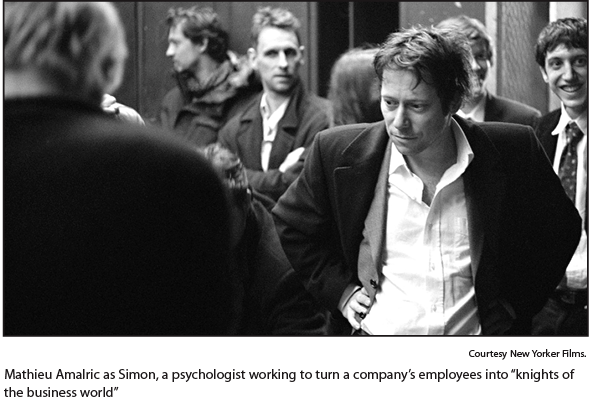By Leonard Quart
Heartbeat Detector Directed by Nicolas Klotz
Cinema Village
22 E. 12th St. at University Pl.
(212-924-3363, cinemavillage.com)
The celluloid combination of ambition and formal imagination doesn’t always succeed, but occasionally results in a provocative and stimulating film. That’s the case with this coolly cerebral new French film, “Heartbeat Detector,” directed by Nicolas Klotz and based on “La Question Humaine,” a novel by François Emmanuel.
“Heartbeat Detector” stars the gifted and extremely edgy Mathieu Almaric, best known for his superlative turn in 2007’s “The Diving Bell and the Butterfly.” Here, he plays Simon Kessel, a psychologist working assiduously to improve employee productivity—“to turn them into knights of the business world”—for a Paris-based German chemical firm. Simon is a smart, highly skilled technocrat who does the corporation’s bidding without questioning the nature of his assignments. Asked by one of his bosses, Karl Rose (Jean-Pierre Kalfon), to investigate the sanity of the firm’s tormented, elderly music-loving director, Matthias Just (the venerable Michael Lonsdale), Simon enters a much more morally complex and shadowy world than he could have ever imagined.
Klotz depicts the corporation as a soulless place that belches endless plumes of ominous smoke. It employs a group of good-looking, well-dressed young executives who at work are utterly conformist. One of Klotz’s most evocative shots shows a row of execs standing shoulder-to-shoulder in front of a row of urinals. After work, the men get drunk at strobe-lit raves—dancing wildly to a hypnotic, pounding beat—and engaging in sadomasochistic role-playing that ritualizes the intensely competitive ethos of their professional lives.
Almaric’s Simon is a quietly agitated man whose relationships with women are brutally sexual—desperately groping for ecstasy as if at the end of his rope. The film, however, provides no exposition for his character so much of Simon’s behavior and interactions appears inexplicable—even absurd—though always emotionally suggestive.
In the film’s first half Simon listens to flamenco singers as they croon of ”disconnectedness” and “meaningless journeys” and he remains utterly untouched, contemplating his corporate assignment rather than hearing the lyrics. But Simon’s perspective is transformed after learning from Just how Nazis and right-wing groups had an impact on the firm’s operations. Simon feels genuinely distressed, and his despair grows after reading an anonymous memo that contains detailed information implicating Just’s own father for his service to the Nazis. Consequently, Simon faints in the street, and no longer possesses desire for the woman with whom he has had a passionate relationship. He awakens from nightmares in which Just plays chamber music as the clothes of concentration camp prisoners are sorted into bins.
Simon tracks down the writer of the anonymous letters—a former member of the chemical firm, Arie Neumann (Lou Castel). In a penultimate scene, an imperturbable, longhaired Neumann (a witness to the Holocaust) strikes an oracular tone with Simon about the substitution of technical language for a humane one, and about a past where human life was debased. The powerful closing image is of an all-black screen where one hears a haunted Simon intone a litany of names (“Amos,” “Samuel”) of the “naked boys with bruises” whose bodies and limbs were dropped into burial pits during the Holocaust.
“Heartbreak Detector” is a portentous and sometimes inchoate film. It contains close-ups of despairing people in pubs and the Metro that seem gratuitous, and one never fully understands where Simon’s capacity for such profound identification with the victims of the Holocaust originates. I’m most disturbed by the film’s merging its revulsion with the callous and dehumanizing behavior of the corporation with the horrors of Holocaust. The parallel is a strained one, and it devalues the critique of the corporation; the Holocaust feels as if has been inserted to elevate the film’s significance. Still, the flawed “Heartbreak Detector” is a haunting and challenging film.


































